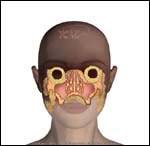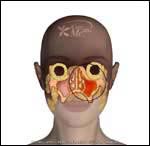 DESCRIPTION
DESCRIPTION* Sinuses are open cavities. An infected sinus is known as sinusitis. The maxillary and frontal sinuses are the two main sinuses that become infected. The maxillary sinuses are located on the inside cheeks of both sides of the nose. The maxillary sinuses drain through the nose. In addition, the ears drain fluid into the maxillary sinuses by way of the eustachian tube. The eustachian tube may become blocked or inflamed from a sinus infection, resulting in pressure, pain, or fullness in the ears. The frontal sinuses are located in the lower part of the forehead just above the bridge of nose.
* Sinusitis usually occurs either after a viral infection (cold/runny nose) or after allergy symptoms begin. This occurs because of swelling in the nasal tract tissue, which drains the sinuses, causing them to become swollen. The sinuses accumulate fluid and mucous, allowing bacteria to grow in the sinuses, which causes the sinusitis.
ABNORMAL

SYMPTOMS
* Pain/pressure over the sinuses
* Occasional upper tooth pain
* Pain and tenderness over the forehead
* Ear pressure
* If symptoms do note resolve in three weeks, or do not respond to antibiotics, this may represent Chronic Sinusitis. Please see the section on Chronic Sinusitis for more details.
CAUSE
* Streptococcus pneumoniae
* Hemophilus Influenza
* Moraxella catarrhalis
* Staphylococcus aureus
HOW THE DIAGNOSIS IS MADE
* Transilluminator may show a fluid collection
* Sinus X-Rays
* A CT scan of the sinuses is more accurate than an X-Ray
* Cultures are not helpful unless done by a needle placed into the sinuses (and this is not done unless the case is extreme)
TREATMENT
* Oral antibiotics are usually administered for 10 to 14 days. Commonly used antibiotics include Ceftin, augmentin, or cipro.
* Older antibiotics, such as Amoxicillin and Erythromycin may be prescribed, but you should be aware that they do not provide the same scope of coverage that Ceftin, augmentin, or cipro. They have poor coverage when dealing with Haemophilus Influenza as well.
* Oral Decongestants, such as Sudafed, and nasal sprays such as Afrin, for the first 3 days may be helpful (after 3 days a "rebound" may occur, and the decongestants may no longer be effective).
* Take a warm shower twice a day, and blow out your excessive mucous.
* Saline nasal sprays may be used multiple times during the day to loosen nasal secretions.
SIMILIAR CONDITIONS
* Tooth Abscess
* Mucormycosis
* Sinus cancer
MISCELLANEOUS
* Predisposing Causes
1. Viral Rhinitis (Cold)
2. Allergies
3. Dental problems
4. nasal polyps



No comments:
Post a Comment